In a significant development following a series of impactful assaults by Ukraine on Russia’s Black Sea Fleet, the Kremlin has ousted its top naval commander, marking the most significant repercussion thus far. Adm. Nikolai Yevmenov, who has led the Russian Navy for the past five years, was relieved of his command and replaced by the head of Russia’s Northern Fleet.
Reports of Admiral Yevmenov’s dismissal surfaced from both Ukrainian and Western officials, with Russian publications, quoting anonymous sources, first disclosing the news on Sunday. The Financial Times further corroborated the development on Monday, citing insights from Ukrainian officials. However, the Russian government has refrained from officially confirming any personnel changes at this time.
The dismissal of Admiral Yevmenov comes in the wake of Ukraine’s increasingly effective strikes on the Russian Black Sea Fleet. Despite lacking a conventional navy or warship fleet, Ukraine has managed to deploy sea drones and missiles to devastating effect, sinking an estimated 15 Russian ships over the past six months alone. These victories have not only dealt a blow to Russia’s naval capabilities but have also facilitated the reopening of the western Black Sea, enabling Ukraine to resume shipping grain from Odesa.
A Ukrainian military intelligence official attributed Admiral Yevmenov’s removal directly to the loss of Russian ships, highlighting the strategic significance of Ukraine’s recent successes. It is estimated that since the onset of the war two years ago, approximately a third of Russia’s Black Sea Fleet, which originally comprised 80 vessels, has been decimated. The symbolic importance of these losses was underscored by the sinking of the Moskva, the Russian flagship, in April 2022, marking a symbolic victory for Kyiv.
Moreover, the practical ramifications of Ukraine’s naval campaign have been profound, prompting Russia to retreat its fleet from Ukraine’s coast and withdraw from the western Black Sea altogether. Observers have noted the strategic shift, with the Polish foreign minister declaring that Ukraine has essentially secured control over the western half of the Black Sea, allowing the country to resume vital trade routes to traditional markets in Africa and China.
At a Senate hearing, William J. Burns, the C.I.A. director, emphasized the potential for Ukraine to sustain its success with additional military assistance from the United States. He underscored Ukraine’s ability to continue striking Crimea and the Black Sea Fleet, citing the sinking of 15 Russian ships in the past six months as evidence of Ukraine’s capacity to exact costs against Russia.
The decision to replace Admiral Yevmenov was deemed logical by Ukrainian military analysts, given Russia’s failure to effectively defend its fleet against Ukrainian attacks. Despite the lack of official confirmation from the Kremlin, reports suggest that Admiral Aleksandr A. Moiseyev, head of Russia’s Northern Fleet, will assume command. However, Admiral Yevmenov remains listed as the naval commander in chief on the Russian military’s official website.
The Kremlin’s silence on the matter echoes previous instances of opacity regarding changes in naval leadership, underscoring the secretive nature of Russian military affairs. Despite the lack of public acknowledgment, the repercussions of Ukraine’s naval victories reverberate within Russia’s military hierarchy, prompting speculation and scrutiny both domestically and internationally.
As Ukraine continues to assert itself in the maritime domain, the ramifications for Russian naval strategy and leadership dynamics remain uncertain. The Kremlin’s response to Ukraine’s growing naval prowess will undoubtedly shape the trajectory of the conflict in the Black Sea region and beyond.

